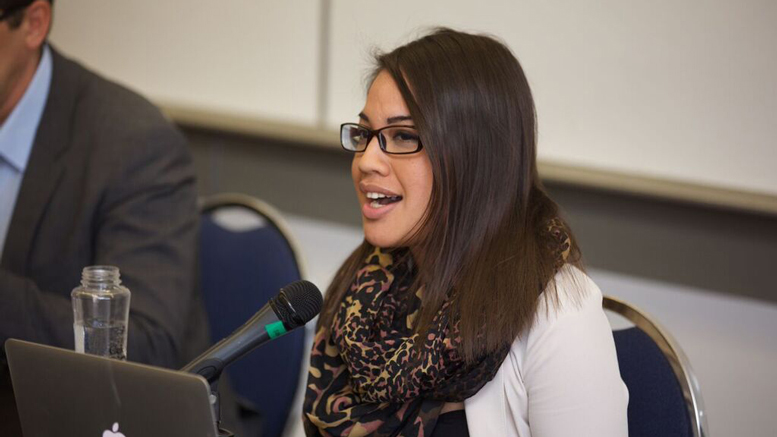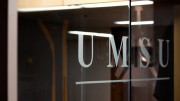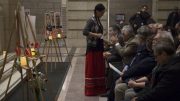The University of Manitoba is taking steps to meet its strategic goals and expand indigenous education into every faculty and discipline.
Indigenous education was put in the front seat of the university’s 2015-2020 strategic plan, which calls for every graduate of the U of M to leave with an understanding of the struggles and contributions indigenous peoples have made in Manitoba and Canada.
In December, the university signed a memorandum of understanding with the Treaty Relations Commission of Manitoba to bolster treaty education and inked its name on the Manitoba Collaborative Indigenous Education Blueprint along with six universities, three colleges, and the Manitoba School Boards Association.
The blueprint commits the U of M to work to increase access to programs and services for indigenous students, while integrating indigenous knowledge and intellectual traditions into curricula.
The Fort Garry campus is also home to the National Centre for Truth and Reconciliation, which holds a collection of documents, oral histories, and records gathered throughout thousands of hours of testimony collected over a six-year period.
“There really isn’t any excuse for anyone not to become informed or aware of the indigenous people of this country because there’s resources everywhere,” said Deborah Young, the university’s executive lead for indigenous achievement.
The question facing the university, she said, is how to implement indigenous teachings into programming.
It could come in the form of a mandatory course or credit requirement – which will take effect in the fall at the University of Winnipeg – or from integrating indigenous perspectives into existing course outlines.
The idea of a mandatory credit or course was broached at a Jan. 28 panel during the university’s second annual indigenous awareness week. It was also floated through social media and an online poll on the university’s UM Today webpage.
“I’m curious to know what students have to say about this because this is going to impact how they approach their academic studies,” Young said.
“The more they get themselves involved and informed and lend their views, [the more they] will help map where the university is going on this.”
Young said an Instagram post on the university’s account promoting the panel garnered more feedback, both positive and negative, than anything posted before it.
As of Monday, 71 per cent of respondents to the online poll voted that the U of M should not have a mandatory indigenous requirement, while 18 per cent said the knowledge should be integrated in another way and 11 per cent welcomed a mandatory credit or course. 653 votes were cast.
Young said she supports an integration model, bringing indigenous perspectives into existing course outlines. However, she noted programs working directly with affected communities, including law, medicine, and social work, should include more in-depth indigenous programming.
“I think it’s absolutely key that social workers [for example] graduate with not just a basic understanding but a comprehensive understanding on the history of residential schools and the Sixties Scoop because all of that has an impact on the well-being of our communities,” she said.
Ashley Richard, president of the Association of Aboriginal Commerce Students, takes a similar stance.
Richard argued against a mandatory credit at the January panel, calling for an integrative model more connected to a student’s academic path.
“I think it adds more value when you can make a direct correlation between the knowledge that you’re gaining and what you’re studying,” she told the Manitoban. “You’re more willing to accept it, you’re more willing to integrate it into the way you think and how you live your life.”
She said it would take some creative thinking but integration could include community outreach projects, or other course-relevant options.
“I think it’s re-evaluating the way you look at what defines credit hours,” she said. “How can every student gain a certain level of indigenous knowledge that is applicable to what they’re doing?”
Mandatory credits?
Kristin Richard, co-president of the University of Manitoba Aboriginal Students Association, said the U of M should follow in the steps of the University of Winnipeg and Lakehead University, which have both introduced mandatory indigenous credits for all students.
She argued math and writing credits are compulsory for all graduates and said a similar indigenous requirement would only round out a student’s education.
“I think that everybody who lives in Canada should know about indigenous people and the struggles and the history,” she said. “It makes you more of a well-rounded person if you do know about it.”
The development of a mandatory credit or course requirement would not be without controversy, however.
On a Facebook discussion that appeared below a post inviting students and faculty to attend the January panel discussion, several respondents resisted the idea of a mandatory credit. One argued mandating the courses would turn prospective students away from the U of M. Another accused the university of instituting a cash grab.
“There’s a chronic ignorance when it comes to indigenous issues throughout the country which is epitomized in attitudes like that,” said Niigaanwewidam James Sinclair, acting head and assistant professor in the department of native studies.
Sinclair argued that it is incumbent on the U of M to produce graduates with an understanding of indigenous history, adding that “well-informed Canadian citizens should have a full knowledge of indigenous issues.”
“All this should happen in course delivery but it isn’t,” he said. “It isn’t happening in high school experiences, in elementary school experiences, and then we’re faced with the chronic problem of producing under-qualified, ill-equipped Canadian citizens and the University of Manitoba should do better than that.”
Sinclair supported mandatory indigenous programming at the panel but said more university support of the native studies department is needed, especially if programming is to be expanded. He said he is asked to sit in on various faculty committees on a daily basis and is already stretched thin.
Speaking to the panel – which was attended by nearly 70 students, faculty and staff – Kenneth Young, a University of Manitoba alumnus and the first student from a First Nations community to graduate from the Robson Hall faculty of law, said he is of two minds on the issue.
He agreed indigenous education should be prioritized at the university level but said more focus should be placed on the public school years from kindergarten to Grade 12.
“I believe where we will capture the imagination of the population of Canada regarding our people would be in public school system, where it should be mandatory that the history of our people be taught in a significant way,” he said.
“Because if you teach it at this level, you’re going to miss out on a lot of people who are not here at this institution.”
A roundtable discussion surrounding indigenous education was hosted at the Fort Garry Campus Feb. 4. Further consultations are scheduled for the William Norrie Centre March 18, 12:30-2 pm and Bannatyne campus March 30, 12:30-2 pm




